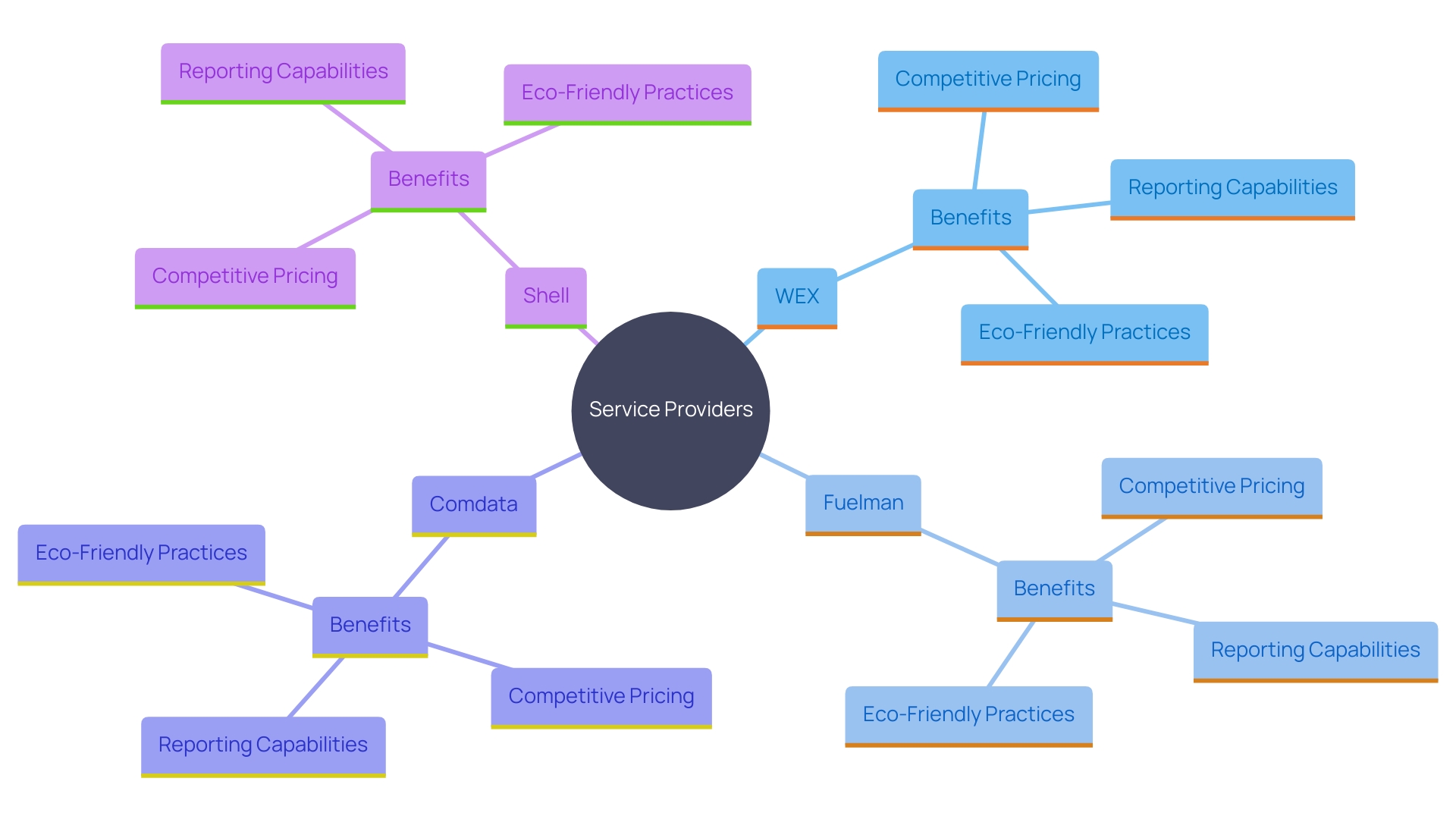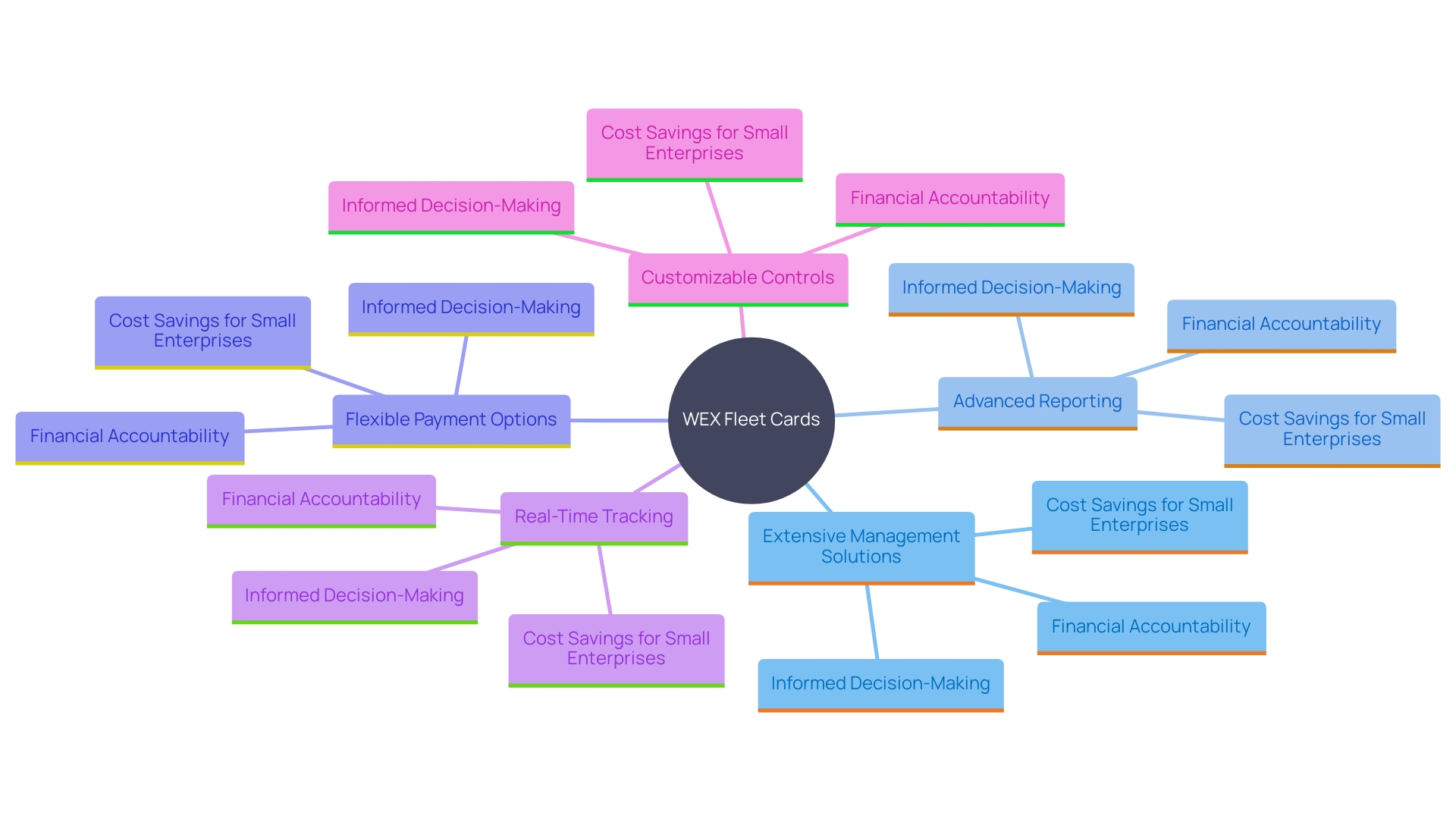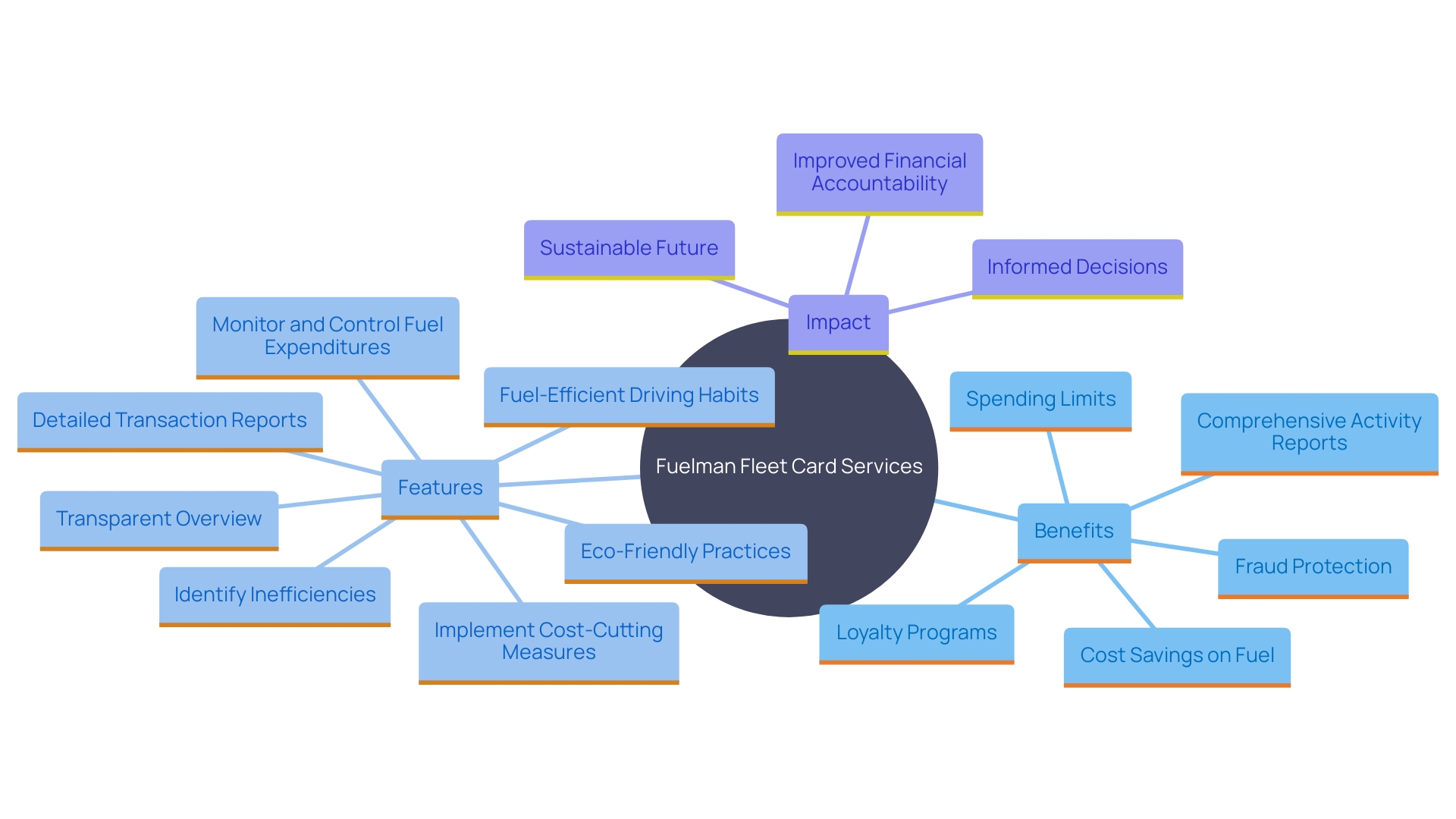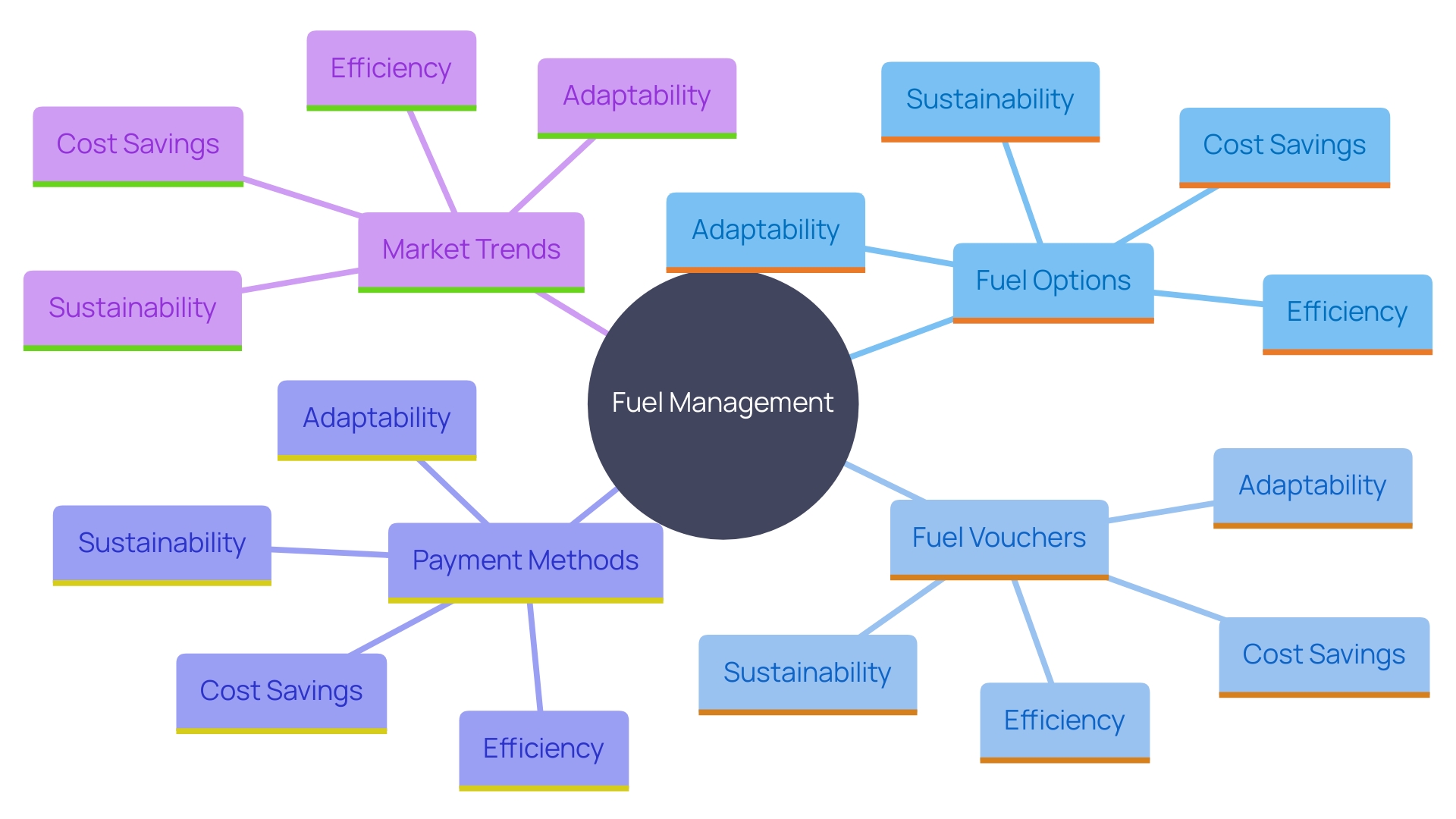Introduction
In today’s competitive business landscape, managing fuel expenses efficiently is crucial for small business owners, particularly those with a fleet of vehicles. This article delves into the essential features to consider when selecting a fuel card, highlighting how these financial tools can significantly reduce fuel costs and streamline operations. By examining top fuel card providers such as WEX, Fuelman, Comdata, and Shell, the article provides insights into the unique benefits each offers, including discounts, reporting capabilities, and security features.
Additionally, the article compares various fee structures and rebate systems to help businesses make informed decisions. Ultimately, choosing the right fuel card can enhance financial accountability, promote sustainable practices, and support overall business growth.
Key Features to Consider in a Fuel Card
Choosing the appropriate payment option for small enterprises requires assessing various essential characteristics. The acceptance network is crucial, as it defines the areas where the payment method can be used, ensuring coverage that aligns with the organization’s operational routes. Discounts, whether volume-based or fixed rebates, can significantly lower energy costs, which is a substantial portion of an organization’s budget. Reporting and management tools offered by fuel card providers deliver detailed expenditure insights, enabling organizations to oversee and manage fuel costs efficiently. This level of transparency aids in identifying potential inefficiencies and implementing cost-saving measures. Moreover, considerations around limits on exchanges and security features are essential to protect against fraud and misuse. Lastly, comprehending any related fees ensures there are no concealed expenses that could affect the financials. By providing extensive solutions that go beyond simple transactions, these payment methods allow companies to make informed choices, enhance financial responsibility, and promote more sustainable practices.
Top Fuel Card Providers for Small Businesses
Numerous service providers specialize in assisting small enterprises, delivering customized solutions that match their distinct requirements. Notable companies in this space include WEX, Fuelman, Comdata, and Shell. Each provider offers unique benefits that can significantly impact a small business’s bottom line. For instance, payment options from these providers are equipped with features like competitive pricing structures, robust reporting capabilities, and savings tools designed specifically for fleet operations.
A refueling pass is more than merely a means of payment; it is a monetary instrument that streamlines energy management while offering a variety of advantages. These documents enable companies to oversee and manage energy costs efficiently. Comprehensive purchase reports provide a clear summary of where, when, and how much energy is acquired, allowing companies to recognize possible inefficiencies and apply cost-reduction strategies.
Moreover, energy cards contribute to financial accountability and eco-friendly practices. By offering extensive solutions that extend beyond basic transactions, they enable companies to make informed choices and encourage sustainable practices. This strategic action can improve oversight, effectiveness, and cost reductions in resource management processes, proving particularly advantageous for enterprises with a fleet of vehicles.

WEX Fleet Fuel Cards: Overview and Benefits
WEX Fleet Cards serve companies of every scale, including small ventures, providing extensive management solutions for energy. Their vast acceptance network ensures convenience, while advanced reporting features provide detailed insights into fuel expenses. Benefits include flexible payment options, real-time transaction tracking, and customizable spending controls. These features enable organizations to make informed decisions, enhance financial accountability, and contribute to cost savings. By streamlining energy management, WEX Fleet Cards assist small enterprises in efficiently tracking and managing energy expenses, recognizing inefficiencies, and executing cost-reduction strategies.

Fuelman Fleet Fuel Cards: Features and Discounts
Fuelman Fleet Card Services offer small enterprises a strong resource to oversee and lower their energy costs efficiently. These items provide significant reductions on fuel acquisitions at a wide variety of places, with savings options that include a base rate of 2 to 8 cents back on each gallon of fuel. Additionally, some cards offer extra discounts at certain gas stations, making them especially beneficial for companies with a fleet of vehicles.
The comprehensive features of Fuelman Fleet Fuel Cards extend beyond simple exchanges. They consist of comprehensive activity reports that provide companies clear understanding of energy purchases, enabling accurate oversight and management of energy costs. This level of detail empowers companies to identify inefficiencies and implement cost-saving measures. Moreover, traditional expense reimbursement systems, which can be time-consuming and error-prone, are streamlined by consolidating all fuel-related expenses into a single, easily manageable account.
Fraud protection is another critical feature, safeguarding businesses against unauthorized transactions. Moreover, the capability to establish spending limits on energy costs ensures that businesses remain within budget restrictions. Fuelman also provides loyalty programs that enhance savings for regular users, contributing to improved financial accountability and sustainability in energy management practices. By selecting Fuelman Fleet Fuel Cards, companies can make informed decisions, optimize their fleet operations, and achieve significant cost savings.

Comparing Fuel Card Fees and Rebates
Comprehending the fee arrangements and rebate systems of various fuel options is essential for small enterprise owners seeking to enhance their fuel costs. Fuel options provide extensive solutions that extend beyond basic exchanges, enabling companies to make informed choices. ‘Certain options may impose monthly or transaction fees, while others might offer lower rebate percentages but no upfront costs.’. For instance, fleet refueling accounts generally provide a base rate of 2 to 8 cents back on each gallon of gasoline, along with extra savings at certain service stations. This can significantly assist in managing expenses and earning rewards, especially for organizations operating a fleet of vehicles.
Additionally, petrol payment methods improve financial responsibility by offering comprehensive transaction summaries, enabling organizations to track and manage fuel costs efficiently. This transparency helps identify potential inefficiencies and implement cost-cutting measures, contributing to a more sustainable and financially sound operation. Considering the increasing energy expenses and financial strains, like the recent tax hike on gasoline from 48.8 cents per liter to 49.6 cents per liter, choosing the most economical energy payment option based on particular consumption trends is more crucial than ever.
Choosing the Right Fuel Card for Your Small Business
Choosing the appropriate fuel option requires a thorough evaluation of your company’s requirements, including fuel usage trends, preferred gas stations, and financial management choices. Fuel vouchers offer significant advantages, including detailed transaction reports that provide transparency and help identify inefficiencies. This enables companies to implement cost-saving measures and optimize fleet management effectively. For example, the top fleet refueling options provide a base rebate of 2 to 8 cents per gallon and extra savings at certain gas stations, making them especially advantageous for companies with a group of vehicles.
Additionally, gasoline payment methods serve an essential purpose in encouraging environmentally friendly habits by allowing companies to track and control energy use. This can lead to the adoption of fuel-efficient driving habits among employees, contributing to sustainability efforts.
As the North American energy payment market continues to expand, with a valuation anticipated to hit US$ 230.9 billion by 2031, choosing a solution that can adapt with your business is crucial. The growing output of commercial vehicles and the surge of e-commerce have propelled the need for all-encompassing payment solutions. These tokens not only assist in managing costs but also connect with online shopping platforms, simplifying expense management for delivery services.
Ultimately, the perfect payment solution should offer both savings and convenience, providing resources that extend beyond basic transactions to enable informed choices and enhance financial responsibility. By adopting a fuel card, businesses can enhance control, efficiency, and cost savings in their fuel management processes, ensuring a more sustainable and financially sound operation.

Conclusion
Efficient management of fuel expenses is essential for small businesses, especially those operating fleets. Selecting the right fuel card can lead to significant cost reductions and streamlined operations. Key features such as acceptance networks, discount structures, and robust reporting capabilities should be carefully evaluated to ensure alignment with business needs.
The ability to monitor fuel expenditures through detailed transaction insights not only promotes financial accountability but also aids in identifying inefficiencies that can be addressed for further savings.
Leading providers like WEX, Fuelman, Comdata, and Shell offer tailored solutions that cater to the unique requirements of small businesses. Each provider brings distinct advantages, including competitive pricing, customizable spending controls, and loyalty programs that enhance savings. Understanding the fee structures and rebate systems associated with these fuel cards is critical for making informed decisions.
This knowledge helps businesses choose options that maximize benefits while minimizing hidden costs.
In the context of rising fuel prices and increasing economic pressures, the importance of selecting a cost-effective fuel card cannot be overstated. The right choice not only supports financial sustainability but also encourages eco-friendly practices, contributing to overall operational efficiency. As the fuel card market evolves, businesses must prioritize solutions that offer both convenience and strategic advantages, enabling them to thrive in a competitive landscape.
By embracing these financial tools, small business owners can enhance their fuel management processes, ensuring a more sustainable and economically viable future.


